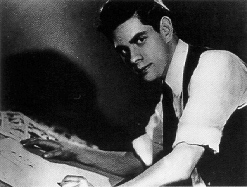Superman Comic Books
Joe Shuster
 Joe Shuster was born in Toronto, Canada on July 10, 1914. At the age of nine, his family moved to Cleveland, Ohio where he would later meet Jerome Siegel.
Joe Shuster was born in Toronto, Canada on July 10, 1914. At the age of nine, his family moved to Cleveland, Ohio where he would later meet Jerome Siegel.In 1932/33 the pair edited & published their own fan magazine covering the new fantasy fiction of the day. The fanzine, aptly titled "Science Fiction" lasted six issues. It was during the time they published Science Fiction that they were exposed to Phillip Wylie's pseudo-science fiction novel "Gladiator", which was destined to be the seminal influence for the Siegel & Shuster creation which itself would become one of the most important fantasy characters of all time. That character, "Superman", would even later be the model for scores of other super powered comic heroes, giving birth to the "Golden Age of Comics" in the late 1930's.
Having first introduced the super character as a villain in their fanzine in a story entitled "the Reign of the Superman", the duo eventually molded him into a comic strip which they had unsuccessfully marketed as early as 1936, during which time they each earned a living by writing (Siegel) and drawing (Shuster) comic stories for DC-National.
Henri Duval, Spy, Radio Squad, Slam Bradley, Federal Men and the more popular Dr. Occult kept them at DC until finally DC editor Sheldon Mayer took a chance & had Superman published as the lead feature in DC's inaugural issue of the now famous "Action Comics". (One story has Max (M.C.) Gaines sending the feature over to Mayer). Superman was an instant hit and less than one year later was promoted to his own book - a first for any super hero!
Unfortunately for the two creators, a common practice at the time of Superman's first appearance was for the publisher to retain all rights to the character. Thusly, they had no financial or copyright interest in Superman, even though they did receive good pay for supplying DC with stories and art throughout the early forties. The Saturday Evening Post reported that the pair had a combined 1940 income of over $75,000!
But this compensation still did not please them, and in 1946 after having tried for years to get DC to let them in on the millions of dollars they were making, they finally decided to sue the comics publishing giant.
They were represented by a New York attorney by the name of Albert Zugsmith, who himself would later go to Hollywood where he became a producer of generally low budget thrillers & hot-rod genre films.
The case was settled in the New York State Supreme Court in 1948 with the creative team receiving the comparatively small settlement of $120,000. That sum was less than the pair would have made supplying stories to DC during the two years that the court case continued.
It was also after this settlement that the Siegel & Shuster byline, which had appeared on every story since 1938, was summarily dropped. As such, other than in a historical or creative context, their names had not appeared in conjunction with Superman, until the 1980's when DC reinstated the byline.
Shuster would leave the comics field during the late forties, and Siegel's presence was very limited at best until finally he also left comics.
Many have commented that Shuster's artwork was done in a crude, narrative style (which comic artist Jim Steranko likened to editorial cartooning) which was reminiscent of Milton Caniff's art. Indeed, under his own inks, Shuster was very polished and illustrative, and his style itself became a model for many artists in the comic book industry during the thirties until the art of Lou Fine, Will Eisner, Jack Kirby and the influence of Hal Foster, Caniff & Alex Raymond revolutionized the medium.
Siegel & Shuster would again sue DC in 1978 for royalties from the Superman character, and through the help of comics artists Neal Adams and Jerry Robinson, as well as public outcry from the comics hobby, they received a settlement from DC for $35,000 each per year for the remainder of their lives.
Still a paltry settlement when taking into account the hundreds of millions of dollars that DC made off the character in comics, from movies & radio, toys & other merchandising. Even while DC sued other publishers, like Fawcett & Fox for plagiarizing their flagship hero, they themselves were copying him in their own books (Starman in Adventure Comics being the most obvious). Siegel & Shuster did not profit from these in-house swipes either.
Joe Shuster, nearly blind & very bitter about his treatment from DC died in 1992 just short of his seventy-eighth birthday. Though forgotten by the publisher that should have eulogized him as their savior, he will never be forgotten by the millions of fans worldwide who have read his legendary creation.
Copyright © 1996, Richard Halegua (herriman@wizard.com)
Comic Art & Graffix Gallery - http://www.comic-art.com Where you'll find these and other Biographies for creators of Comic books in general.
Used with kind permission from the author.
